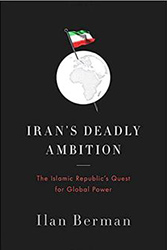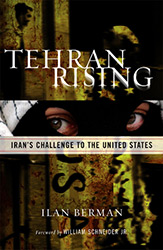 |
|
 |
| biography | articles | blog | media coverage | spoken | books | mailing list |
Latest Articles
Iran's Unexpected Regional Revival
Spring 2024 • Horizons
On April 13th, the "shadow war" that has raged between Israel and Iran for decades finally broke into the open. That day, Iran's clerical regime fired over 300 drones and missiles at Israeli territory in retaliation for Israel's targeting of a top Iranian military commander in Syria days earlier. The massive Iranian attack, and Israel's limited response days later, has ushered in an ominous new "balance of terror" in the Middle East. Iran's escalation was all the more surprising because, by all accounts, the Iranian regime should be on the strategic back foot, grappling with deeply adverse domestic and international conditions that have cumulatively posed a serious challenge to its legitimacy and longevity. And yet, the Islamic Republic is unquestionably once again on the march in the Middle East.
A Litmus Test For Biden's Iran Policy
May 3, 2024 • Newsweek
Back in February, Iran's clerical regime marked the 45th anniversary of the Islamic Revolution, the 1979 religious revolt which successfully overthrew the Pahlavi monarchy and installed a radical theocracy in its stead. In commemorative speeches and pronouncements, its officials struck a triumphalist tone. "We see that the system of the Islamic Republic continues to advance with authority and does not recognize any obstacles in its path," Iranian President Ebrahim Raisi said on Feb. 11. Raisi and his colleagues certainly have a great deal to be happy about. Economically, Iran is on dramatically firmer footing than it was just a few short years ago. A recent exposé by The Washington Free Beacon found that, since 2021, the Iranian regime earned $90 billion from illicit oil sales to countries like China and India—replenishing badly depleted state coffers in the process. Regionally, the Iranian regime has been emboldened by a lack of decisive response from Washington to act more assertively—both directly against U.S. allies such as Israel and via proxies against American interests throughout the Middle East. And at home, Iranian regime officials—who not long ago were on the back foot in the face of sustained grassroots protests—have redoubled their domestic repression, launching a sweeping national plan to enforce restrictions on female dress and conduct. What accounts for this reversal of fortune? A great deal can be attributed to permissive American policy. From its first day in office, the Biden administration made a rollback of Trump-era "maximum pressure" against Iran—which had successfully drawn down the Islamic Republic's reserves by more than 95 percent, to a mere $4 billion—a major priority. Instead, following in the footsteps of the Obama administration, Team Biden has doggedly attempted to reengage Iran's ayatollahs in some sort of diplomatic compromise. In the service of that effort, the White House has rolled back enforcement of existing sanctions and turned a blind eye toward the lion's share of Iran's regional rogue behavior. The end result has been what some have termed a policy of "maximum deference" toward Tehran.
Hasbara Doesn't Work: Israel Needs A New Form Of Messaging
April 24, 2024 • The Jerusalem Post
It's long been an accepted fact that Israel is terrible at hasbara (public diplomacy). For decades, the Jewish state has struggled to convey its point of view, and explain its actions, to largely hostile global publics. All too often the traditional ways it has tried to do so – speeches, interviews, and formal communiques – have failed to move the needle on world perceptions in a meaningful way. Even so, the six months since the horrible events of October 7 have been a wake-up call. It would be an understatement to say that Israel has been caught off guard by the explosion of global anti-Israel and antisemitic sentiment that followed Hamas's campaign of terror and the subsequent Gaza offensive. It has found itself unprepared for a global media environment where Hamas claims and statistics are treated uncritically, where Israeli communiques are scoffed at, and where foreign actors such as Russia and China help amplify disinformation that is intended to erode the Israeli position. Simply put, Israel now finds itself not only in a physical fight against Hamas (and, increasingly, Iran itself), but in an informational one as well. Against this backdrop, a qualitatively new approach to winning global "hearts and minds" is required.
The Iranian-Israeli Cold War Is Turning Hot
April 16, 2024 • The National Interest
Any serious observer of the Middle East knows that, long before Hamas' October 7 terror campaign and the resulting military offensive in the Gaza Strip, Israel was already embroiled in an undeclared war with another regional actor: the Islamic Republic of Iran. Jerusalem and Tehran have been waging a clandestine conflict throughout the region for decades. Over the years, that "shadow war" has entailed a great many things, fromcovert action to cyberattacks to targeted military strikes. But until now, it has been waged indirectly and largely away from the international spotlight. All that changed on April 13, when the Iranian regime launched a direct attack on the Jewish state from its soil for the first time. The massive offensive, involving 170 drones, 30 cruise missiles, and 120 ballistic missiles, was ostensibly a response to an Israeli airstrike on Damascus days earlier that killed a high-ranking Iranian general. But it also marked a major evolution in Iranian strategy—one with significant ramifications for the Middle East as a whole.
Israel Seeks A New Strategic Concept
April 11, 2024 • National Institute for Public Policy Information Series No. 583
On October 7, 2023, the Palestinian terrorist group Hamas carried out a brazen, large-scale attack on communities in the south of Israel. The offensive, dubbed "Al-Aqsa Flood," entailed the breaching of the border fence separating Israel from the Gaza Strip by hundreds of militants, and subsequent systematic assaults on population centers, social gatherings, and other soft targets. The results were horrific; Hamas' campaign of terror left more than 1,200 Israelis dead in the largest slaughter of Jews to take place since the Holocaust more than eight decades earlier. In response, Israel has launched a large-scale military offensive in the Gaza Strip – a protracted campaign that, six months later, is still ongoing. Its goals are two-fold, albeit potentially contradictory. The first is to remove Hamas from power in the Gaza Strip, degrade the group's strategic capabilities, and prevent it from ever presenting a threat to Israeli security ever again – an objective that, Israeli officials have made clear, will require the establishment of a new "security regime" in the enclave. The second is to secure the return of the 130-plus hostages that remain in Hamas captivity. In tandem with its military offensive against Hamas, however, Israel has experienced a deeper strategic shift. A sea change is now taking place in Israel's approach to security affairs, informed by the errors and miscalculations that made the atrocities of October 7th possible.
Books by Ilan Berman




home | biography | articles | blog | media coverage | spoken | books | mailing list | mobile site